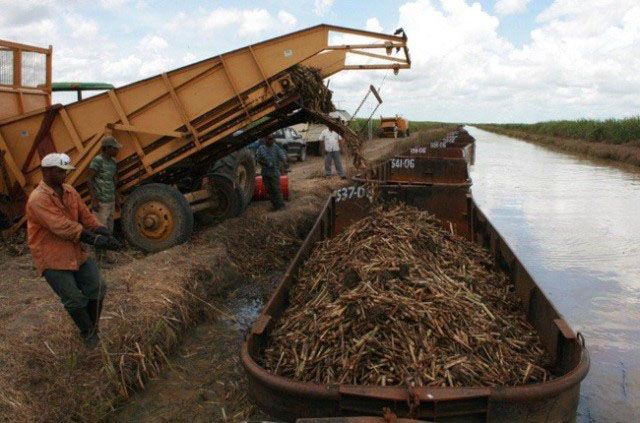Government’s plan to transport cane from Skeldon to Albion for processing should be reassessed as the 41 miles average trek poses not only potential cane juice depletion to an already crippling industry but adds expenses way above production costs, the APNU+AFC has said.
In addition, the opposition believes that using an average of 17 trucks or tractors per day poses traffic hazards and can destroy the roadways.
“Here again we go putting money into a black hole. It is an ill-advised decision. It is (the distance from Skeldon to Albion) about 41 miles. The costs – trucks, materials and all of that – for transportation is going to create additional expenses for us and now even more than the cost of production,” APNU+AFC’s main speaker on agriculture Khemraj Ramjattan lamented yesterday.
“What this government is not doing is telling us the cost per pound for production. We [the opposition] understand it is almost US 33 cents and our selling price is US 17 cents. When you bring these additional costs in transportation, it is clear to see it is not worth it all. It’s stupidity to the highest…” he added.
Ramjattan said that traffic along the 41 miles Berbice roadway could also be congested and the heavy laden trucks would add to destroying the roads.
“When you are now going to bring those heavyweight vehicles… There will be damage to your road, maybe accidents and all manner of things on the road. To have 17 trucks traversing creates hazardous conditions on an already congested road. It is crazy!” he expressed.
Late last month, Minister of Agriculture Zulfikar Mustapha announced that the replanting of cane had commenced at the Skeldon Estate and that it will be crushed at the Albion and Rose Hall factories.
At a meeting held at the Skeldon Estate, Mustapha stated that they have started to mechanise 5,000 hectares of land there with replanting of canes already started. “We are hoping that by the end of this year we can plant a substantial amount of canes in that 5,000 hectares and also the intention is to complete an additional 5,000 hectares from Skeldon that we will crush at Albion and Rose Hall factories that have the capacity to crush more canes,” he said.
While this is being done they are working to improve the overall performance of the two factories, he added.
Noting the investments being made by the government to improve the sugar industry, Mustapha said they are hopeful that by the end of the year there will be 60% mechanisation of the industry. “We are purchasing new … harvesters. We are outsourcing planting because there is a problem with labour too and what we are doing we are trying to modernise the industry so that we can harvest and plant mechanically,” he said.
Sugar workers had also reported to President Irfaan Ali, during an outreach in Crabwood Creek around the same time, that there were managerial issues on the estates, and as such the President ordered Mustapha to meet with sugar workers.
At his meeting, Mustapha urged the workers to speak up about their issues stressing that they would not be victimised. Workers reported that since the closure of the Skeldon Estate those who were relocated to the Albion Estate have been facing a number of issues. According to them, some weeks they are given less than three days of work which affects their ability to properly provide for their families.
Mustapha then ordered the estate’s officials present to ensure that the workers receive at least five days’ work. He said that there should be no different treatment between workers from Albion and Skeldon.
Additionally, workers said that they needed travelling allowances as they have to put in extra hours to travel from Skeldon to Albion to work. Mustapha asked the officials to look into this.
Ramjattan said that the Skeldon to Albion joint work was just not feasible and the government should look at this and not from a political standpoint.
He said that if it is the case that they want to create employment for workers in Berbice, there are other areas that can be explored, also in agriculture. Reasoning that youth today are not interested in manual cutting and harvesting of canes as their ideal jobs, he said that the government should create avenues for them to develop diverse skill sets.
“The 18 to 35 year olds don’t want to cut cane and it isn’t that they don’t want to work or look at agriculture but they prefer to go into other agri projects, say [for example] prawns, the hot and sweet peppers cultivation. There are so many other agricultural products that can be looked at. Plantains is also one…,” he expressed.
He also questioned if the government consulted with residents of Berbice and cane farmers before announcing the plans. He believes that if they did they would have gotten other ideas on the process. Ramjattan said that at one point ideas were floated to invest in a dedicated track to transport the cane.
This newspaper also understands that one idea was to have “a small grinder at Skeldon which would cost about US$1 million to US$2 million and would remain there permanently”.
Ramjattan said that he couldn’t emphasise enough that the plans for the cane transport wouldn’t work, and his views had nothing to do with politics but simple logic. “This is not worth it…and it is not going to work. Not going to work at all…,” he said.





